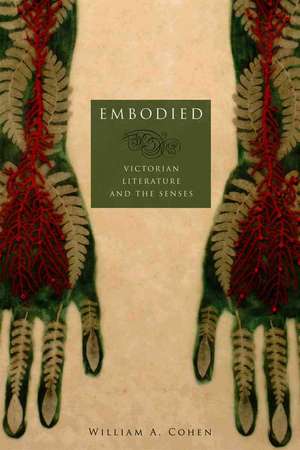Embodied: Victorian Literature and the Senses
Autor William A. Cohenen Limba Engleză Paperback – 16 dec 2008
Making sense of the body in Victorian literature
What does it mean to be human? British writers in the Victorian period found a surprising answer to this question. What is human, they discovered, is nothing more or less than the human body itself. In literature of the period, as well as in scientific writing and journalism, the notion of an interior human essence came to be identified with the material existence of the body. The organs of sensory perception were understood as crucial routes of exchange between the interior and the external worlds.
Anatomizing Victorian ideas of the human, William A. Cohen considers the meaning of sensory encounters in works by writers including Charles Dickens, Charlotte Brontë, Anthony Trollope, Thomas Hardy, and Gerard Manley Hopkins. Rather than regarding the bodily exterior as the primary location in which identity categories—such as gender, sexuality, race, and disability—are expressed, he focuses on the interior experience of sensation, whereby these politics come to be felt. In these elegant engagements with literary works, cultural history, and critical theory, Cohen advances a phenomenological approach to embodiment, proposing that we encounter the world not through our minds or souls but through our senses.
What does it mean to be human? British writers in the Victorian period found a surprising answer to this question. What is human, they discovered, is nothing more or less than the human body itself. In literature of the period, as well as in scientific writing and journalism, the notion of an interior human essence came to be identified with the material existence of the body. The organs of sensory perception were understood as crucial routes of exchange between the interior and the external worlds.
Anatomizing Victorian ideas of the human, William A. Cohen considers the meaning of sensory encounters in works by writers including Charles Dickens, Charlotte Brontë, Anthony Trollope, Thomas Hardy, and Gerard Manley Hopkins. Rather than regarding the bodily exterior as the primary location in which identity categories—such as gender, sexuality, race, and disability—are expressed, he focuses on the interior experience of sensation, whereby these politics come to be felt. In these elegant engagements with literary works, cultural history, and critical theory, Cohen advances a phenomenological approach to embodiment, proposing that we encounter the world not through our minds or souls but through our senses.
Preț: 200.08 lei
Nou
Puncte Express: 300
Preț estimativ în valută:
38.28€ • 40.08$ • 31.68£
38.28€ • 40.08$ • 31.68£
Carte tipărită la comandă
Livrare economică 05-19 aprilie
Preluare comenzi: 021 569.72.76
Specificații
ISBN-13: 9780816650132
ISBN-10: 0816650136
Pagini: 216
Ilustrații: 1 b&w illustration
Dimensiuni: 152 x 229 x 13 mm
Greutate: 0.28 kg
Ediția:1
Editura: University of Minnesota Press
Colecția Univ Of Minnesota Press
ISBN-10: 0816650136
Pagini: 216
Ilustrații: 1 b&w illustration
Dimensiuni: 152 x 229 x 13 mm
Greutate: 0.28 kg
Ediția:1
Editura: University of Minnesota Press
Colecția Univ Of Minnesota Press
Notă biografică
William A. Cohen is professor of English at the University of Maryland. He is the author of Sex Scandal: The Private Parts of Victorian Fiction and coeditor (with Ryan Johnson) of Filth: Dirt, Disgust, and Modern Life (Minnesota, 2005).
Recenzii
"Remarkable, rare, and full of elegant, ineluctable insights, Embodied is unfailingly smart. Readers across many disciplines will grasp how the Victorians advanced ahead of postmodern dicta as they forged materialist thought, even when they talked in terms of mind and soul. An exquisite study." —Kathryn Bond Stockton, University of Utah
"Victorian literature has seldom been more unsettlingly physical than it is in William Cohen’s hands. A tour de force of cultural phenomenology, Cohen’s Embodied shakes up our sense of the Victorians and so refreshes our senses themselves." —Joseph Litvak, Tufts University
